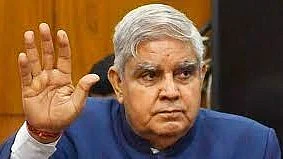Dhankhar’s next step: From VP enclave to Chhatarpur farmhouse
As per unnamed officials, Dhankhar is currently lodged at the Gadaipur property of Indian National Lok Dal leader Abhay Chautala

Former vice-president Jagdeep Dhankhar has reportedly quietly decamped from his official residence to a private farmhouse in Delhi’s Chhatarpur, six weeks after dramatically resigning from office.
According to unnamed officials, Dhankhar is currently lodged at the Gadaipur property of Indian National Lok Dal leader Abhay Chautala, in what is being billed as a temporary arrangement until he is allotted the palatial Type-VIII bungalow he is entitled to as a former vice-president.
On paper, this is little more than a matter of real estate logistics. But in the political corridors of Lutyens’ Delhi, the episode has fuelled speculation worthy of a political thriller. Dhankhar has been conspicuously absent from the public eye since stepping down on 21 July, the very first day of the monsoon session of Parliament. Officially, he cited health concerns as his reason for resignation. Unofficially, whispers abound about whether those “concerns” extend far beyond yoga routines and dietary discipline.
For now, the former vice-president is reduced to a ghostly figure in Delhi politics: not quite gone, but curiously invisible. The fact that a man who was the second-highest Constitutional functionary of the Republic has vanished from political discourse has not gone unnoticed. In a government that prefers to trumpet every resignation, appointment, and inauguration with fanfare, the studied silence on Dhankhar’s whereabouts has been deafening.
Opposition leaders have hinted — half in jest, half in alarm — that the former vice-president may as well be under “house arrest by stealth”, his farmhouse residency now a velvet cage rather than a retreat.
Adding to the intrigue, sources friendly to Dhankhar — unnamed, again —insist he is merely whiling away his time with family, practising yoga and keeping his reflexes sharp over a game of table tennis. One imagines the Modi government would prefer this narrative: the image of a serene elder statesman, not a sidelined insider who perhaps saw or said too much.
Yet Delhi’s grapevine refuses to be pacified. After all, Dhankhar’s resignation cuts short a constitutionally mandated term that should have lasted until August 2027 — hardly the sort of tenure one abandons lightly.
Meanwhile, attention now shifts to the 9 September election for Dhankhar’s successor. Ordinarily, a vice-presidential poll is one of the most predictable fixtures in India’s parliamentary calendar: a Constitutional formality conducted with minimal fuss, where the ruling alliance’s arithmetic all but guarantees victory. Yet in this instance, what should have been routine has taken on the air of high drama.
The NDA has fielded C.P. Radhakrishnan, the current governor of Maharashtra, while the Opposition INDIA bloc has rallied behind retired Supreme Court judge B. Sudershan Reddy. The line-up itself might not quicken pulses, but the stakes have become strangely amplified.
For a government increasingly besieged by questions — over electoral malpractices which the INDIA bloc has repeatedly called 'vote chori' following Rahul Gandhi's rallying cry, over the functioning of Constitutional institutions, and over crushing tariffs imposed by the US — the vice-presidential election has acquired a symbolism far greater than its procedural role.
A straightforward contest is being read as a referendum on the regime’s grip over Parliament, its ability to hold allies together, and even its comfort with dissent within its own senior ranks.
Dhankhar’s sudden exit, in this light, transforms a mundane vote into yet another test of strength for a government that likes to project inevitability. The vacuum he leaves behind is less about an office than about credibility. If everything were truly as normal as the official line suggests, the 9 September poll would scarcely merit more than a footnote. Instead, thanks to the mystery swirling around his departure, it has become another stage where the BJP’s critics detect cracks in the carefully polished facade of control.
Adding a further twist, Dhankhar has in recent weeks drawn unexpected backing from sections of Jat farmer leaders, who view him as a figure wronged by the establishment. That could also explain the move to Chautala's farmhouse. Their support is hardly accidental: Dhankhar himself hails from a prominent Jat background in Rajasthan, and many in the farming community see his sidelining as symptomatic of a wider neglect of Jat interests by the current regime.
For communities still simmering after the farm law protests and feeling marginalised in the government’s policy calculus, Dhankhar’s predicament is being recast as symbolic of their own grievances. His silence, ironically, has allowed others to project their discontent onto his absence, making him an unlikely rallying point.
In the absence of clear answers, the speculation persists, and the government’s silence is doing little to quash it. In a political culture addicted to narrative control, the mystery surrounding Jagdeep Dhankhar feels almost like an uncharacteristic slip — unless, of course, it is by design.
With PTI inputs
Follow us on: Facebook, Twitter, Google News, Instagram
Join our official telegram channel (@nationalherald) and stay updated with the latest headlines
